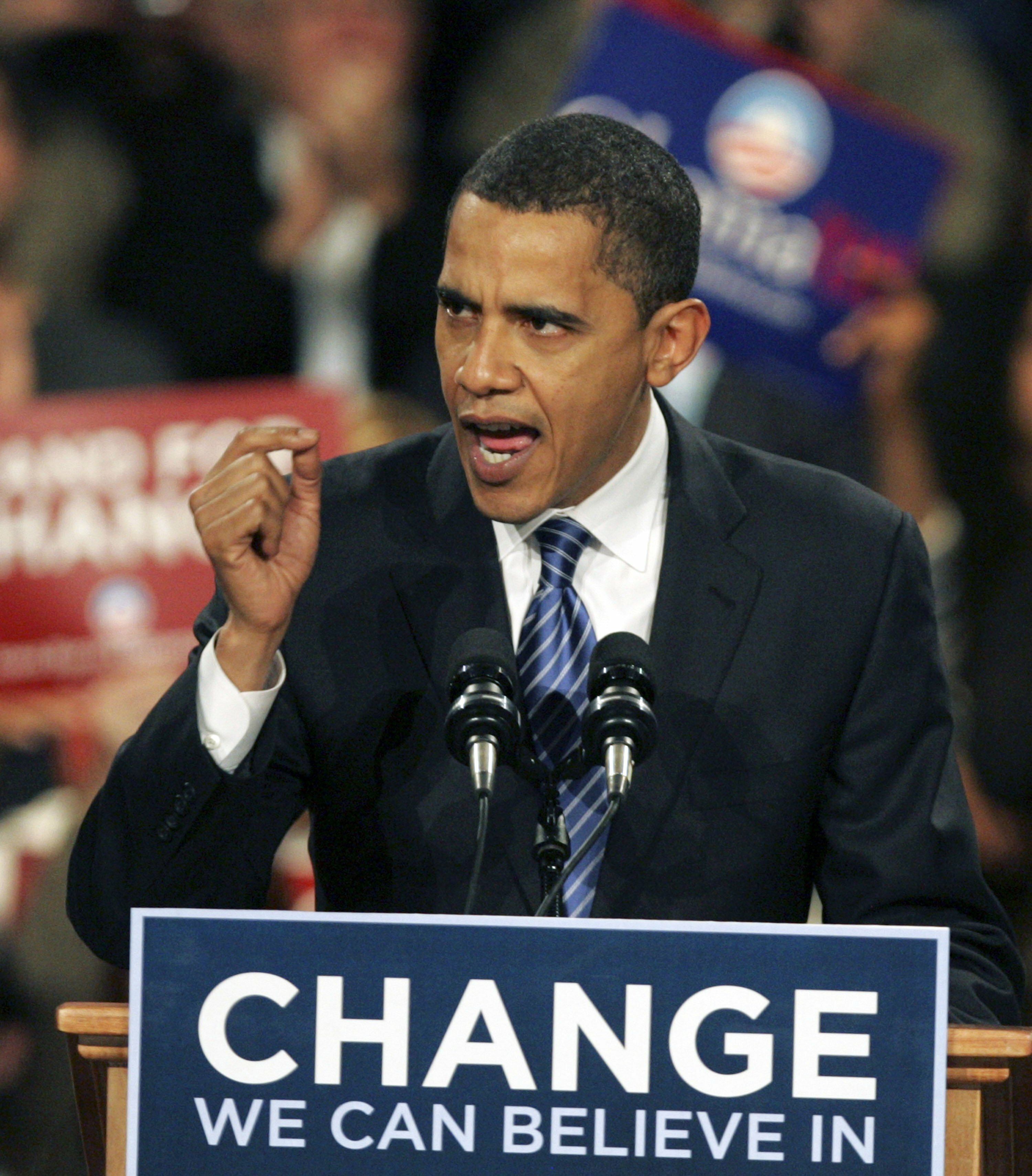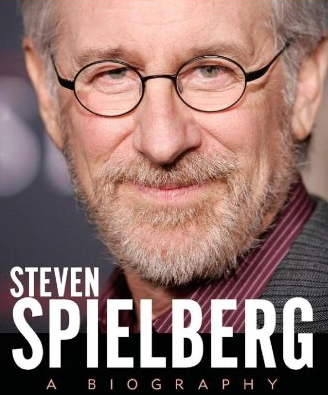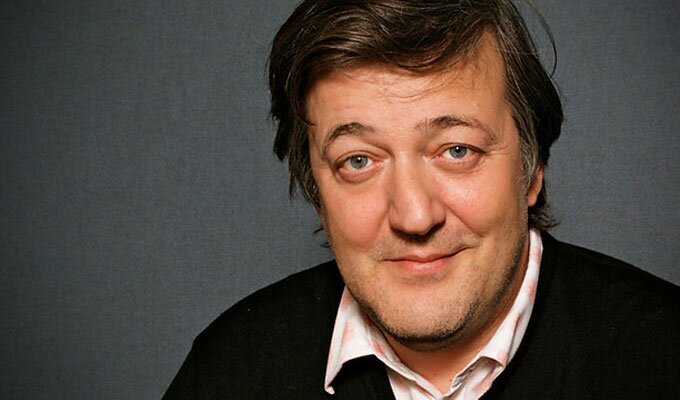 Stephen John Fry has been the national treasure of the television world for almost two decades now, and continues to light up our screens thirty years after his big break in 1982 with The Cellar Tapes. Since then Stephen has written multiple best-selling books, narrated video games and appeared in some of the most prestigious documentaries, films, plays and comedy series’ that modern times have had the pleasure to witness.
Stephen John Fry has been the national treasure of the television world for almost two decades now, and continues to light up our screens thirty years after his big break in 1982 with The Cellar Tapes. Since then Stephen has written multiple best-selling books, narrated video games and appeared in some of the most prestigious documentaries, films, plays and comedy series’ that modern times have had the pleasure to witness.
But the ladder that Fry climbed to get to where he is today was no laughing matter and it’s a ladder that most of you reading this today will also have to undergo in your own unique way. As a child, Stephen Fry was subjected to an extremely disturbed scene; a scene that involved spending time in jail, being expelled from school and having to constantly cover up his homosexuality. In later years Fry also suffered with bipolar disorder, suicidal thoughts and all the struggles that come with being a famous gay rights activist.
With all of this suffering it’s hard to believe that Stephen is as successful as he is. And that’s why I’m writing about him today. In most of my inspiration series posts I’ve looked at directors, artists and writers; but in this post I’m going to discuss the reasons why I cannot help but admire Stephen Fry. He didn’t have the smoothest of journeys (and still experiences inconveniences today) but it’s a journey that lead to triumph in spite of all the odds and it’s therefore a journey we can both learn from.
Out of the Fry-ing Pan & Into the Fire
The difficult life and times of Steven Fry…
On the 24th August 1957 Steven Fry was born in Hampstead London to parents Marianne and Alan Fry. Alan was an English physicist and inventor. His mother was Jewish woman.
On a 2006 episode of Who Do You Think You Are? – a documentary investigating the family trees of famous people – Fry traced his maternal ancestry and found that many of his relatives had been sent to or subjected to the tragic ordeal of Nazi concentration camps during the second world war.
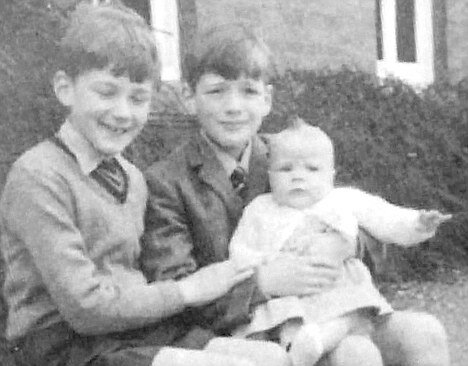 Together the Fry couple had two other children; their eldest son Roger and Stephen’s younger sister Joanna. The family were raised in a small village near Norfolk called Booton. It was here that Fry briefly attended a number of schools such as Cawston Primary, Souts Hill Preparatory and Uppingham School.
Together the Fry couple had two other children; their eldest son Roger and Stephen’s younger sister Joanna. The family were raised in a small village near Norfolk called Booton. It was here that Fry briefly attended a number of schools such as Cawston Primary, Souts Hill Preparatory and Uppingham School.
Despite being described as a “near asthmatic genius” by his teachers, Fry was expelled from Cawston (for unknown reasons) and Uppingham for stealing from a teacher, running off to London and watching X-rated films. It was around this time that Fry was also struggling to keep his homosexuality a secret.
After leaving Norfolk College of Arts, Fry lost much of his motivation to work and planned to spend the night sleeping rough. He went into a local pub and stole the nearest coat to him. But unfortunately for Fry the coat had a credit card in the pocket – one specifically belonging to a family friend – and was sent to jail for three months. During his sentence, Fry’s mother frequently visited her son; bringing him crosswords from every copy of the Times since he had been away.
On release, Fry resumed his education in Norfolk after promising to work hard again on his studies. He did so well in his Cambridge entry exams that he gained a scholarship to go there and graduated with upper second-class honours in English Literature. Cambridge was a turning point for Fry. He appeared on the University Challenge and met future comedic collaborator Hugh Laurie whom attended the same Footlights Club as him.
The Footlights Club is a traditional community group that focused on the theatrical life and performing arts. It drew Fry and Laurie together in their teenage years. Their friendship has continued beyond this though and the pair have remained so close that, in recent years, Fry was made best man at Laurie’s wedding and godfather to his three children.
Career
Fry’s career in television is perhaps the most significant of his achievements. His big break came with the broadcasting of The Cellar Tapes (1982) which was written in the Footlight community group by Fry and Laurie alongside Emma Thompson and Tony Slattery.
The sketch immediately caught the attention of television company Granada who hired the writers to star in the comedy show There’s Nothing to Worry About! alongside rising comedian Ben Elton. The series was so successful that second series, re-titled Alfresco, was broadcast the following year followed by a third two years after that.
Following Fry and Laurie’s victory as a comedy duo; the BBC offered Fry and Laurie their own show The Crystal Cube. Unfortunately the airing of the show was cancelled after the first episode but Fry and Laurie weren’t disheartened by this and shortly got back on their feet, appearing in more and more episodes, series and sketches such as Happy Families and Saturday Live.
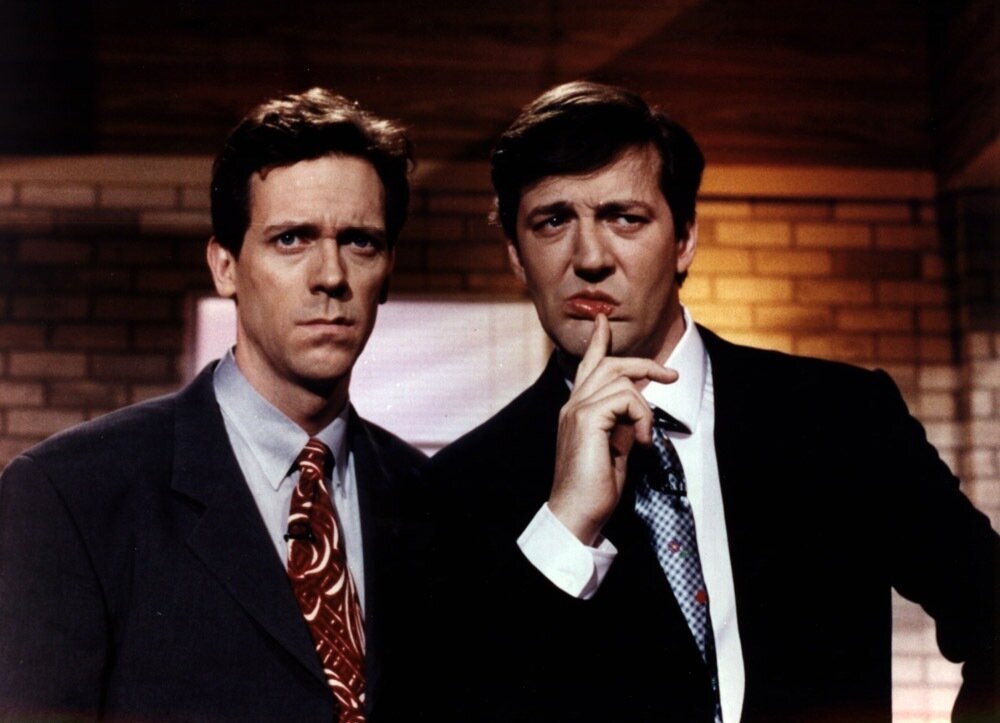 In 1986 the BBC forgave the double act for their Crystal Cube failure and assigned them a sketch show A Bit of Fry & Laurie which ran for 26 episodes and were extremely popular with audiences. During this time Fry and Laurie also juggled starring in the second, third and fourth series of Blackadder alongside Rowan Atkinson. Like Laurie, Atkinson remained a life-long friend for Fry who was again made best man at his wedding to Sunetra Sastry in New York.
In 1986 the BBC forgave the double act for their Crystal Cube failure and assigned them a sketch show A Bit of Fry & Laurie which ran for 26 episodes and were extremely popular with audiences. During this time Fry and Laurie also juggled starring in the second, third and fourth series of Blackadder alongside Rowan Atkinson. Like Laurie, Atkinson remained a life-long friend for Fry who was again made best man at his wedding to Sunetra Sastry in New York.
It was uphill from there in Fry’s independent career; he starred in multiple television series’ – such as Jeeves, Holy Flying Circus, Absolute Power and a Christmas series of short films called Little Crackers – and appeared in a number of BBC play and novel adaptations including The Common Pursuit, Malcolm Bradbury and The Borrowers.
Alongside the work in television, Fry appeared in multiple movies – most recently The Hobbit – has been the voice behind best-selling audio books – most famously the Harry Potter series – and narrated various video games such as Little Big Planet and Fable.
None of these appearances, in my eyes, can be consider greater or more prestigious than another; but they were all steps that built on Fry’s previous work and paved his way for the next big opportunity – therefore all of them can be counted as significant achievements and experiences. But it wasn’t until the millennium, that Fry’s influence grew big enough for use in more charitable and educational purposes.
Fry, His Struggles & His Charitable Influence…
Despite obvious successes; it hasn’t been easy for Stephen and these struggles were obvious from the early days of his career when he fled the West End stage three days into the run of the Common Pursuit out of stage fright. Bipolar disorder can make it extremely hard for sufferers to control their nerves and impulses and after this event Fry went missing for several days, even contemplating suicide.
But that wasn’t the first time Fry has attempted suicide and it wasn’t the last. Most recently, in 2012, Fry revealed that he had attempted the previous year while filming abroad. But Fry didn’t let this get the best of him, or become an excuse not to spread his wings further. Instead he released a couple of documentaries on the psychological issues that were close to his heart; bipolar disorder and HIV.
His documentary Steven Fry: the Secret life of a Manic Depressive reaped an Emmy award and a British Academy Television award for its delicate tackling of this difficult issue and attempt to bring awareness to the public. Similarly his HIV and Me provoked an award from Sussex University for his celebrated work in campaigning for mental health and HIV sufferers.
He had also worked on other educational documentaries focusing on nature – Spectacled Bears: Shadow of the Forest, Ocean Giants, Last Chance to See – Literature – Fry’s Planet Word- and technology – Steven Fry’s 100 Greatest Gadgets- all of which were successful and popular in their own way. But Steven Fry is most well known for his comedy panel game show QI which he began hosting in 2003 (to date) along with Alan Davies. QI has had the highest viewing figures for any BBC Four show.
Worth noting is the considerable amount of influence that Stephen wields through his use of Twitter where he promotes various charities, brings attention to underexposed musicians and authors and raises awareness to his followers of contemporary issues in the world of media and politics
Although some may say Fry has made his success, he continues to spread his wings today and has hosted the BAFTA Film Awards, broadcast various BBC Radio 4 programmes and written three fiction novels, several non-fiction works and two Auto biographies alongside his television career and now writes a weekly technology column for The Guardian and a blog which attracted more than 300,000 visitors in its first two weeks of running. Say what you want about Steven Fry. Say what you want about television being a time waster. But nobody can deny that this man is a prime example of why it’s important to live out our full potential.
Life Lessons: What you can learn from Steven Fry…
1) Look to Your Childhood, to Locate Your Life Purpose
As a teenager Steven Fry flourished in performing arts and struggled with his sexuality and budding bipolar disorder. As an adult Fry used his skills in this area to pave his way for the world of television and used the struggles he faced to bring meaning to the work that he did. A great way to resolve our weaknesses is to acknowledge them and use them (and our growing influences) for good. This might mean bringing awareness to other people, or simply giving yourself motivation and reason to keep working.
2) Live Your Life to its Full Potential
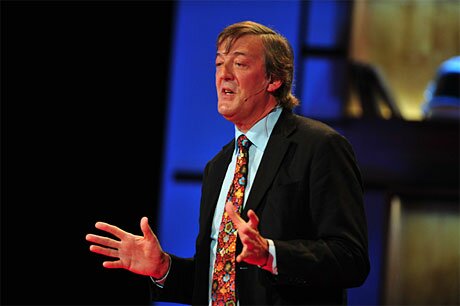
Stephen Fry TED Global 2009
According to research, nobody in the world (ever) achieves their full potential.
This is in terms on entrepreneurial work and the sections of our brain that we channel and unlock.
But it’s important that we, as potential world changers, at least try our hardest with the opportunities, skills and experiences that we have. Never say no to a creative opportunity. Never say no to collaboration. It’s just as likely to succeed as it is to fail, and failure is the best teacher for the entrepreneurial minded.
We are not born to develop in a single area alone, but we are born to educate ourselves and to broaden our horizons with age. And that’s why Steven Fry has been able to branch out from comedic television series’ to films, books, video games, radio broadcasts and documentaries, because he went into his path with an open mind.
3) Find Value in Even the Smallest of Steps
I don’t like the lottery. I believe that we are much more likely to achieve our millions through hard work than we are luck and that we should always aim to make our own in life. After all; what stories and experiences can be told from winning the lottery? And this ideology, I believe, can be applied to Steven Fry’s story.
He knew that it was rare for a big break to simply jump out from nowhere and say ‘howdy’ so he decided to make his way to the top of the ladder through a series of small leaps which could be collected together in a final influence. In a sense, he snowballed the opportunities he had and a collection of small sketches and television appearances grew to a collection of larger sketches and television roles.
In the end these roles became so big, they were independent works. Documentaries about Fry. Books written by Fry. Television series’ starred by Fry. And I think this is one of the best ways to approach a success journey because it also means that failures, such as Hugh Laurie and Fry’s early BBC attempts, are much easier to come away from because there are other projects close to hand.
Steven Fry is not a presenter, an author, a comedian. He is all of these things. And he is all of these things despite obvious setbacks; which is perhaps one of the qualities that all great men bare.
Wrote by Aimee Hall - Part of the Inspirational People Series
